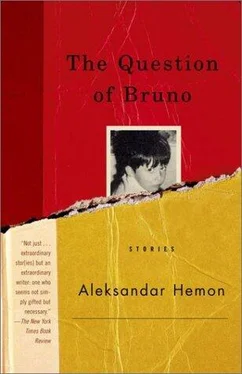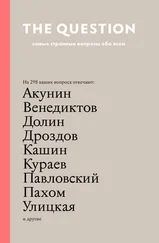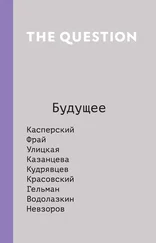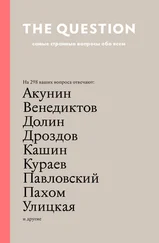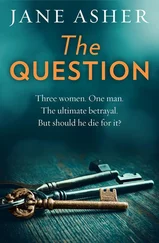But, of course, they would never let him out of the Vienna airport, and he had to get to work on Monday.
“Do not leave your baggage unattended!” the voice warbled.
Pronek roamed back to the Johann Strauss Café and saw the man with the silver cross, guzzling down another mug. On the plate in front of him there were two identical, parallel, crescent bratwurst, along with two symmetrical puddles of ketchup and gall-yellow mustard. He felt ravenous hunger. He sat down, summoned the waiter, and ordered the bratwurst. There were violins pinned to the wall, above the Mozart-full shelf, like wingless butterflies. A gray-haired man was squeezing by between the tables, his arms and face splattered with shingles. Pronek realized that the man in the black shirt had a ripening boil on his neck — a fiery red bulb protruding right above the collar. Pronek called the waiter, labeled Johann, and informed him that he had changed his mind and he didn’t want the bratwurst. The waiter glared at him, curling up his upper lip, his apple cheeks fidgeting, and then coughed a little, perilously close to retching, saying nothing. He pulled out his pen, glaring around, and his little order-taking pad, and scratched Pronek away.
“Passenger Pronek, please report immediately to gate number one,” the willowy voice said, with a tinge of anger in it this time. Pronek finally recognized that it was his name that was being called and ceased peeling the Mozartfoil, the Mozartglobe already peering out suggesting pleasures, but he questioned the reliability of his perception, and discarded the call as another instance of aural hallucination.
“Passenger Pronek, please report immediately to gate number one!”
Now this time Pronek could not deny it. He looked around and noticed everyone staring at him with expectation. He bit into the Mozartball, picked up his hand baggage, and commenced walking cautiously toward gate number one.
We could see his reluctance, his clumsy, indecisive gait, and his crumpled, stained shorts, and his green ten-year-old corrugated polyester shirt. He walked toward the gray rectangle of the metal detector warily, as if aware that once through the gate there would be no way back.
He munched the other half of the Mozartkugeln and rolled the foil into a little ball. He stopped and looked around, as if waiting for a signal, or the audience applauding. Then he looked toward us, but he couldn’t see us behind the gate. We were waiting, knowing that he had nowhere else to go. But he showed no desire to get over there. He made a couple of wobbly steps and then stopped, unwrapped another Mozartglobe, bit into it, and just stood before the gate, chewing and smiling at us, as if he knew we were there.
For a long time I used to go to bed early, but then my parents finally bought their first TV set. I remember full well crouching behind a gray armchair, in the corner of our living room, hiding from the images of a creature that had three legs, a long snakish neck, and a fist-like head, with a furious only single eye sending lethal rays down on terrified people and buildings. The buildings looked like weak, grotesque matchboxes, compared to the progressing monster blowing them, with its gaze, into flaming dust and smithereens. I hid behind the armchair, but — every once in a while — I’d dare to look at the TV across the room, the fake furry texture of the armchair rubbing my cheek, and the horrors on the screen would send me, with bellows, back behind the chair. I would lie down on my convulsing belly, trying to be as tiny as possible, the geometrical, colorful patterns on the carpet as close to me as the inside of my eyelids. I do not know what my parents did while I was writhing in fear, but I remember being alone — there was no one and nothing between me and the three-legged destroyer, apart from the armchair. It had awkward plywood armrests and stubborn, eternally creaking, springs. The movie being shown was, I’m inclined to believe, The War of the Worlds.
When I was sick, I would lie in the living room, because of the TV, and watch Sesame Street or Survival. There would be a little chair by my wrinkled bed, an ex-sofa, with an array of bottles, pillboxes, and lozenges, and a mountain of blown-through and crumpled paper napkins. My mother would pull down the green shades and I would sometimes disregard the TV and, benumbed by a persistent fever, do nothing but watch a sunbeam, which would manage to squeeze in between the two shades, move across the room, pointing, like a blind man’s cane, at things unawares.
And it would stumble upon a bad reproduction of an irrelevant Soviet painting, picturing a desolate autumn forest path. The beam would start on the left side of the painting and go over the stunned cluster of dun and gray birch trees, as if counting them, turning them ochre for a long moment. Then it would go over the assembly of souvenirs, brought by my father from Zaire, on the fake-ebony chest: an erect elephant tusk, pointing at a dark wooden mask with a mouth strained into a gaping grin; a baked-clay owl, enameled in carmine, orange and lemon-yellow colors, with bulging eyes that would follow me all over the room. I would fade in and out of languid, confusing dreams and the beam would move quickly, as if crossing a dangerous street, across the opposite wall. I would look up and, above my head, in the sunbeam, a stream of specks would flow upward, like air bubbles let go by a diver. Then it would go over the heavily laden bookshelf, over the stiff spines of my father’s Russian math books, unperturbed by their intricate titles, and it would finally stop at the right end, and, depending on the season, insist on a spine-torn Beekeeping Encyclopaedia or a never read, orderly lined-up, pristine Selected Works of Joseph Conrad. After that, the beam would cautiously retreat, toward the cleft between the shades, and then it would vanish. The room would fill up with, first, turquoise, then, maroon dusk. The night would set in and the things in the room would become immobile, obscure, silent, and I would lie, listening to the encroaching hum of darkness and my own wheezing slowly disappearing in it.
A thing not to be forgotten: a radio, model “Universal,” with a plywood shell that would reverberate and tremble when I’d turn up the volume to the last notch. The upper front part was covered with burlap-like cloth, behind which one could discern the circular shadows, like breasts under a shirt, of the two speakers. At the front bottom there was a narrow ledge with buttons — like an accordion keyboard, except there were only seven buttons. When the far left button was pressed, the light would go on behind the screen with the names of all the cities of the world: Abu Dhabi, Edinburgh, Cologne, Ankara, Baghdad, Warsaw, Barcelona, Dresden, Cairo, Athens, Copenhagen, Moscow, Vladivostok, Córdoba, Dacca, Dakar, Djibouti, Andorra, The Hague, etc. The right knob controlled the volume, the left knob made the red line between the light and the screen slide behind the city names. Sundry languages would turn into static cracking, bleating, and wailing, or a bass hum, and then back into a different language. I would stop the red line behind a city name — say, Munich — and then listen to the incomprehensible language. I would picture the people who were talking — only their heads, in fact, for I couldn’t imagine their bodies. I would imagine a round-faced, bearded man speaking in Moscow, smacking his lips after every successful sentence; a pale, blond woman warbling from Monaco; an angry, teeth-clenched man in Lagos. Sometimes I would try to guess what they were talking about. I could tell when they were reading the news, because of the flat dullness of their voices; when they were praying, because of the submerged pain in the sounds they were making; when they were reading poetry, because of the whining and undulating. But sometimes they would just speak and I knew nothing about what they were saying: were they talking about their own lives? about their children? about their history? were they telling stories? about what? These meaningless voices were somehow mesmerizing, like music, and I could imagine the space, the streets and buildings and rooms behind them. I could hear the curling, passionate streets of Rome: gurgling Vespas and people at the market arguing over the prices of tomatoes. I could hear the gray sternness of the Potsdam voice: cubic, symmetrical buildings with wide, spacious streets where people looked minuscule and stifled, and policemen stood at corners with leashed German shepherds. I could hear the clamor of the great city behind the Cairo voice: everybody on the streets, the voice passing through a narrow street full of haggard people in burlap robes, selling heaped fruit and strange pastry, and there’s a cage hanging over the door, nearly walled off by shelves burdened with fish, and in the cage there’s a dog, a small, anxious dog, with big flappy ears, and its curious eyes are burning with a red glow.
Читать дальше
